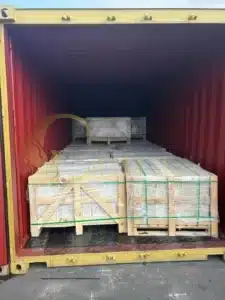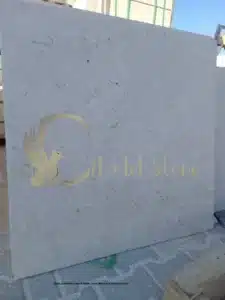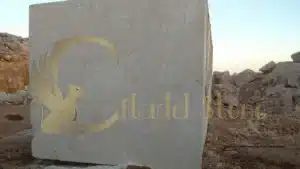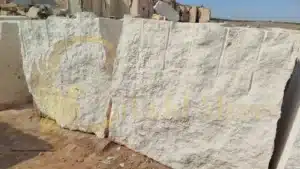Regional overview — where White Pearl limestone is quarried in the Middle East
Turkey remains the dominant commercial source for White Pearl limestone entering international markets, with well-established quarrying operations in the Marmara, Denizli, and Afyonkarahisar regions. Turkish infrastructure advantages—modern extraction equipment, transparent corporate structures, multiple Mediterranean export ports (Mersin, İskenderun, İzmir), and alignment with international trade standards—make Turkey the benchmark for Middle East stone sourcing. Turkish white limestones exhibit the fine micrite texture, warm cream tones, and subtle stylolitic veining characteristic of premium White Pearl varieties.
Syria has re-emerged as a significant sourcing opportunity following the 2025 termination of U.S. sanctions that previously restricted commercial transactions. Syrian deposits near Damascus, Homs, Aleppo, and the coastal mountain ranges historically produced exceptional white limestone prized for color purity and fine texture. With sanctions lifted, quarrying operations are resuming in stabilized regions, infrastructure is being rebuilt, and export channels are reopening. Syrian White Pearl often exhibits denser recrystallization and warmer cream tones than Turkish equivalents, commanding premium positioning for projects requiring distinctive aesthetic character.
Jordan offers stable sourcing through quarries in the northern highlands producing cream-white limestone with similar characteristics to Turkish varieties. Jordanian operations benefit from established export infrastructure through the port of Aqaba, transparent commercial frameworks, and consistent quality. Jordan maintains strong trade relations with the United States and presents straightforward compliance pathways.
Lebanon produces white limestone from Mount Lebanon and Anti-Lebanon ranges, though smaller-scale operations and infrastructure challenges limit export volume compared to Turkish and Syrian suppliers. Lebanese sourcing benefits from Mediterranean port access (Beirut, Tripoli) but requires careful verification of quarry operational status and financial stability.
Egypt quarries limestone from desert regions west of Cairo and along the Nile valley, with some varieties offering light coloration suitable for White Pearl applications. Egyptian export procedures through Alexandria and Port Said are well-established, though quality consistency varies by quarry and finish capabilities differ across suppliers.
Regional selection balances quality requirements, logistics complexity, and stone supplier verification rigor. Turkey offers proven track record and mature infrastructure. Syria presents premium material opportunities with rebuilding supply chains. Alternative sources provide additional options for specific aesthetic or commercial requirements.
Spotlight mini-profiles — Turkey | Syria | Other Middle East
Turkey: The Established Sourcing Standard
Turkish White Pearl limestone pavers represent the industry benchmark for Middle East-sourced material, with decades of reliable export performance to U.S. markets. Quarries in the Denizli basin produce dense, fine-grained limestone with excellent polish receptivity and moderate water absorption suitable for both interior and protected exterior applications. The Turkish stone industry operates under Ministry of Energy and Natural Resources oversight, with quarry operators holding documented mining concessions and export permits readily verifiable through government registries.
Product characteristics: Warm white to cream coloration; fine micrite matrix with subtle stylolitic veining; good recrystallization producing translucent quality when polished; typically lower porosity than travertine; consistent batch-to-batch quality.
Available finishes: Honed, polished, brushed, lightly textured, flamed (for specific densities); large-format slabs up to 320cm length; custom fabrication capabilities widely available.
Logistics strengths: Multiple Mediterranean ports within 200–400km of major quarrying regions; container and bulk vessel capacity; streamlined customs procedures; reliable freight forwarding networks; typical lead time 8–12 weeks ex-works to U.S. East Coast; established banking and payment infrastructure.
Sourcing advantages: Turkish Chamber of Mines membership provides supplier credibility verification; mining licenses verifiable through Ministry records; export permits routinely granted; transparent corporate structures facilitate ownership verification; mature quality control infrastructure; English-speaking commercial contacts common; no sanctions complications.
Syria: Premium Quality, Newly Accessible Market
Syrian white limestone historically commanded premium pricing for exceptional color purity, fine texture, and distinctive warm cream tones from specific geological formations. Following the 2025 termination of U.S. sanctions on Syria, commercial sourcing pathways have reopened for U.S. buyers, though supply chains are in rebuilding phase. Syrian White Pearl often exhibits denser recrystallization and more pronounced translucency than regional alternatives, making it particularly desirable for high-end interior applications and feature installations.
Recent regulatory changes: In 2025, the United States terminated comprehensive sanctions on Syria, including repeal of the Caesar Act and cessation of Executive Order restrictions that previously prohibited most commercial transactions. While enhanced due diligence remains advisable during the post-conflict reconstruction period, Syrian limestone can now be legally imported to the United States through standard commercial channels.
Product characteristics: Exceptionally pure white to warm cream; very fine micrite with minimal terrigenous content; pronounced translucency when polished; distinctive warm undertones; dense recrystallization approaching marble-like quality; often shows elegant linear veining.
Current operational status: Quarrying operations are resuming in stabilized regions; established quarries in Damascus and Homs areas returning to production; infrastructure rebuilding underway; export logistics being re-established through Latakia and Tartus ports; supply chain documentation improving as administrative structures normalize.
Sourcing considerations: Verify quarry operational status (not all pre-conflict operations have resumed); confirm ownership documentation through reconstructed registry systems; conduct enhanced due diligence on beneficial owners; require comprehensive photographic documentation of current quarry conditions; arrange third-party inspection when possible; use secure payment terms (LC or escrow) during market stabilization period; expect longer lead times (12-16 weeks) than Turkish sourcing while logistics networks rebuild.
Citadel Stone’s Syria capability: Citadel Stone has established relationships with verified Syrian quarry operators who have resumed production in stabilized regions. We conduct on-site audits, verify ownership through available registry documentation, commission independent laboratory testing, and manage export logistics through functioning port facilities. Our compliance protocols ensure all Syrian-sourced material meets U.S. import requirements and quality specifications.
Jordan, Lebanon, Egypt: Complementary Sources
Jordan provides stable, straightforward sourcing with cream-white limestone from northern quarries near Irbid and Jerash. Export procedures through Aqaba port follow transparent customs protocols. Jordanian material exhibits moderate porosity requiring sealing for stain-prone applications. Typical lead times 10–14 weeks to U.S. ports. Verify quarry environmental permits and worker safety records through Ministry of Energy and Mineral Resources. No sanctions complications; well-established U.S. trade relationship.
Lebanon offers smaller-scale quarrying with limited export volume. Economic stabilization underway but infrastructure challenges create logistical unpredictability. Verify quarry operational status before committing; use secure payment terms (escrow or LC only); confirm port functionality. Enhanced due diligence recommended given banking sector restructuring and beneficial ownership verification challenges during reconstruction period.
Egypt exports white limestone through established Alexandria customs channels. Quality varies significantly by quarry; extensive sampling and independent laboratory testing essential before volume orders. Confirm quarry ownership through Egyptian Mineral Resources Authority records; verify export permits; inspect for modern extraction practices. Lead times 10–12 weeks to U.S. East Coast. Straightforward compliance; no sanctions complications.
Quarry ownership & transparency — how to confirm who really owns the stone
Verifying quarry ownership protects buyers from fraud, ensures legal material sourcing, and establishes accountability throughout the supply chain. Ownership verification is particularly important in post-conflict regions like Syria where administrative systems are rebuilding.
Corporate registry verification: Request official company registration documents from national commercial registry showing legal entity name, registration number, registered address, directors, and beneficial owners. Verify registration is current and entity maintains good standing. For Syrian suppliers, recognize that registry systems are being reconstructed—request available documentation and supplement with additional verification methods. Cross-reference all parties against current sanctions databases (OFAC maintains SDN list even after general sanctions termination to target specific bad actors).
Land title and mining concession: Obtain copies of land title deed or mining concession granted by relevant national ministry showing legal right to extract stone. Verify concession validity period, geographic boundaries, and authorized extraction volumes. Confirm entity on concession matches entity on sales contract. In Syria, some pre-conflict concessions are being revalidated—verify current status with appropriate ministry.
Tax records and financial transparency: Request recent tax payment receipts demonstrating active, legal business operations where tax systems are functioning. Legitimate quarry operators maintain tax compliance when administrative infrastructure permits. Recognize that some regions may have interim tax arrangements during reconstruction.
Local authority confirmation: Contact local chamber of commerce, mining association, or municipal authorities to verify quarry existence and operational status. Request chamber membership certificates or professional association credentials where such organizations have reformed or resumed operations.
Physical verification: Demand GPS coordinates, recent dated photographs of quarry face showing active extraction, and satellite imagery. Visit quarry in person when security permits or engage independent third-party inspector. Match quarry location to concession documents and sample material to claimed source. For Syrian quarries, Citadel Stone conducts on-site verification to confirm operational status.
Beneficial ownership disclosure: Identify ultimate beneficial owners—individuals who ultimately control or profit from the entity. Require sworn declarations of beneficial ownership. Screen beneficial owners to ensure they are not sanctioned individuals (some Syrian regime figures and entities remain under targeted sanctions even after general program termination).
Supply chain documentation: Trace material from extraction through processing to export. Request invoices, transport documents, and processing facility records demonstrating unbroken chain of custody. Documentation quality is improving in Syria as administrative systems rebuild—work with suppliers committed to transparency.
Quarry Ownership Verification Checklist
- Corporate registration certificate from national commercial registry with current status confirmation (recognize Syria’s registry system is rebuilding)
- Mining concession or land title deed showing legal extraction rights and geographic boundaries
- Tax payment receipts from recent periods demonstrating compliant business operations (where tax systems operational)
- Chamber of commerce membership certificate or professional association credentials (where organizations functioning)
- GPS coordinates and dated quarry face photographs within last 90 days showing active operations
- Beneficial ownership declaration identifying ultimate individual owners with government ID verification
- Sanctions screening results for entity, directors, and beneficial owners—clear status required (check OFAC SDN list even post-sanctions)
- Independent third-party audit report verifying quarry existence, ownership, and operational status (Citadel Stone conducts for Syrian suppliers)
- Export permit authorization from relevant national authority showing legal right to export limestone products
- Environmental and worker safety documentation demonstrating responsible quarrying practices (standards may be evolving in reconstruction period)
Compliance & risk checklist — post-sanctions due diligence & ethical sourcing
While comprehensive U.S. sanctions on Syria were terminated in 2025, prudent buyers maintain enhanced due diligence practices, particularly for countries emerging from conflict or sanctions regimes. Standard import compliance requirements apply regardless of source country.
Sanctions screening (targeted restrictions remain):
- OFAC SDN List check: Continue screening all suppliers, beneficial owners, shipping agents, and financial intermediaries against Treasury’s Specially Designated Nationals list—specific Syrian regime figures and entities remain under targeted sanctions
- Entity screening: Verify no supply chain participants are subject to remaining targeted restrictions or other U.S. sanctions programs
- Ongoing monitoring: Re-screen periodically as sanctions lists update
Trade compliance (standard requirements):
- Harmonized Tariff Schedule (HTS) classification: Determine correct HTS code for imported limestone products (typically 2515 or 2516 series)
- Certificate of Origin: Request government-issued certificate confirming country of origin
- Export licenses: Confirm supplier holds valid export license from country of origin if required by that jurisdiction
- Import documentation: Prepare standard U.S. Customs entry documents (commercial invoice, packing list, bill of lading)
Financial compliance:
- Banking channels: Use established international banking channels; Syrian banking integration with international systems is progressing
- Know Your Customer (KYC) diligence: Collect business licenses, banking references, and commercial documentation
- Payment structure: Use Letters of Credit or escrow services for initial transactions with new Syrian suppliers; establish trust through smaller trial orders before volume commitments
Enhanced due diligence for post-conflict sourcing:
- Operational verification: Confirm quarry is genuinely operational (not just claiming pre-conflict status); request recent production documentation
- Conflict sensitivity: Verify quarrying operations do not benefit sanctioned individuals or entities; confirm business does not involve or fund armed groups
- Labor rights: Assess working conditions, wage payments, and absence of forced labor—particularly important in reconstruction environments
- Environmental responsibility: Verify quarry holds environmental permits; assess rehabilitation plans; confirm compliance with national environmental requirements
- Community impact: Where possible, assess quarry’s relationship with local communities; verify operations do not involve land disputes or displacement issues
Documentation quality expectations: During Syria’s reconstruction period, documentation standards may not match Turkish or Jordanian norms immediately. Work with suppliers committed to transparency and improving documentation practices. Citadel Stone’s verification protocols adapt to evolving standards while maintaining rigorous quality and compliance assurance.
Technical checks & testing to request before purchase
Comprehensive technical documentation protects buyers from material substitution, quality discrepancies, and performance failures. Never rely solely on supplier representations—demand independent verification, especially when sourcing from newly reopened markets.
Technical Documentation Table
| Document | Purpose | What to Request |
|---|---|---|
| Technical Data Sheet (TDS) | Complete material specifications and performance data | Water absorption, apparent specific gravity, compressive strength, flexural strength, abrasion resistance per ASTM or EN standards; quarry source identification |
| Certificate of Analysis (COA) | Batch-specific test results from accredited laboratory | ISO/IEC 17025 accredited lab results for water absorption (ASTM C97), modulus of rupture (ASTM C99), compressive strength (ASTM C170); batch/lot identification matching shipment |
| Petrographic Analysis | Mineralogy, texture, and microstructure assessment | Thin-section photomicrographs with petrographer interpretation; mineral composition; diagenetic features; vein characterization |
| Freeze-Thaw Test Results | Durability in cold climates (if applicable) | ASTM C666 or C1026 results showing mass loss after 50+ cycles; photographic documentation of test specimens |
| Batch Photography | Visual verification of color, veining, and texture range | High-resolution images of quarry face and representative slabs from production lot; minimum 10 images showing variation |
| Physical Samples | Direct evaluation of material | Full-size slabs (not chips) from approved batch in specified finish; minimum 3 slabs showing representative variation |
| Independent Lab Testing | Third-party verification | Buyer-commissioned testing at independent U.S. or internationally accredited laboratory using samples from delivered lot |
| Quarry Operational Documentation | Confirms current production status | Recent production logs, current extraction photographs, operational permits (particularly important for Syrian suppliers resuming operations) |
Specification implications:
Low water absorption (generally below 3% by mass) indicates better freeze-thaw resistance and stain resistance. High flexural strength (typically above 5 MPa) suits spanning applications and thin veneers. Petrographic analysis reveals potential durability issues before installation. Always test samples from the specific batch to be delivered.
Special considerations for Syrian material:
Syrian White Pearl historically exhibited exceptional quality. As quarries resume production, initial batches should receive extra scrutiny to ensure quality matches pre-conflict standards. Commission independent U.S. laboratory testing on Syrian samples before volume commitments. Citadel Stone conducts comprehensive testing protocols for all Syrian-sourced material.
Logistics & export practicalities for U.S. buyers
Middle East limestone reaches U.S. markets through established (Turkey, Jordan, Egypt) and rebuilding (Syria, Lebanon) logistics networks.
Port options and routing:
Turkish material exports through Mersin, İskenderun, or İzmir to U.S. East Coast ports (New York/New Jersey, Savannah, Charleston) via Mediterranean-Atlantic routes. Transit time 25–35 days plus customs clearance.
Syrian material now exports primarily through Latakia and Tartus ports as operations resume. Port infrastructure sustained damage during conflict but rehabilitation is progressing. Initial Syrian shipments may experience longer port processing times as procedures normalize. Transit to U.S. East Coast 28–38 days once containerized. Citadel Stone monitors Syrian port operational status and adjusts routing as needed.
Jordanian material exports via Aqaba; 30–40 days to East Coast. Egyptian shipments from Alexandria; 28–38 days. All routes to West Coast add 7–12 days via Suez Canal.
Container and packaging:
Standard 20-foot and 40-foot containers accommodate palletized crates. Typical 40-foot container holds 25–28 tons of slab material depending on thickness and packaging. Syrian packaging standards are returning to international norms—verify adequate bracing and protection. Citadel Stone specifies packaging requirements and inspects before shipment.
Customs clearance:
U.S. Customs requires commercial invoice, packing list, bill of lading, certificate of origin, and shipper’s export declaration. Syrian certificates of origin are recognized following sanctions termination. Typical clearance 2–5 business days for compliant documentation.
Lead time realities:
- Turkey: 8–12 weeks from order to U.S. delivery (established, predictable)
- Syria: 12–16 weeks currently as logistics networks rebuild (expect improvement over time)
- Jordan/Egypt: 10–14 weeks (established procedures)
Syrian lead times will decrease as port efficiency improves and supply chains mature. Early Syrian orders may face delays; plan accordingly.
Insurance:
Secure all-risk marine cargo insurance from quarry to final destination. Stone is fragile; breakage claims are common. Citadel Stone arranges comprehensive coverage for all sourcing regions including newly accessible Syrian material.
Citadel Stone logistics advantage:
Citadel Stone manages end-to-end logistics for U.S. buyers from all Middle East sources, including newly reopened Syrian supply chains. Our established relationships with freight forwarders, customs brokers, and port agents in Syria ensure smooth processing as systems normalize. We provide consolidated purchasing, professional logistics management, insurance placement, domestic delivery, and claims handling—reducing complexity and costs for U.S. buyers.

Pricing, payment & contractual protections
Middle East limestone pricing reflects quality variation, logistics complexity, and current market conditions. Syrian material may command premium pricing given historical quality reputation and current limited availability as production ramps up.
Pricing negotiation:
Request detailed proforma invoices itemizing all costs. Syrian material prices are stabilizing as quarries resume operations—expect initial premium pricing for high-quality material to moderate as production scales. Compare pricing across Turkish, Syrian, and alternative sources with equivalent quality specifications.
Payment terms for Syrian suppliers:
During market normalization, use structured protection:
- 30% deposit upon contract signature and approved samples
- 60% payment via Letter of Credit confirmed by international bank against inspection documentation
- 10% retained until delivery acceptance and final quality confirmation
Letters of Credit through major international banks provide security for both parties. Syrian banking reintegration with international systems is progressing—LC processing becoming more routine. Citadel Stone facilitates payment structures that protect buyers while enabling Syrian supplier participation.
Quality acceptance protocols:
Specify acceptance criteria: allowable color variation, maximum vein width, finish quality standards, dimensional tolerances, and breakage limits. Include right to independent inspection and rejection of non-conforming material. Define remedies and replacement procedures.
Contractual protections:
- Specific batch identification: Reference exact quarry block numbers; prohibit substitution without approval
- Documented chain of custody: Require full traceability from extraction to export
- Clear governing law: Specify U.S. law governs; include arbitration provisions
- Force majeure limitations: Define acceptable force majeure events carefully given regional stability considerations
- Warranty provisions: Require explicit warranties on material quality, origin, and conformance to specifications
Citadel Stone’s purchasing contracts include comprehensive protections adapted to each source country’s commercial environment.
Supplier scorecard & procurement template
Supplier Scorecard Template
| Criterion | What to Ask/Verify | Pass/Fail | Weight (%) |
|---|---|---|---|
| Corporate legitimacy | Current commercial registry (adapt for Syrian system rebuilding); tax compliance; operating history | Pass = Documentation provided; Fail = Cannot verify | 15% |
| Quarry ownership verification | Mining concession or land title; GPS coordinates; dated photos; operational verification | Pass = Verified; Fail = Unverifiable | 15% |
| Sanctions compliance | Current OFAC screening clear; no SDN matches; beneficial owners disclosed and clear | Pass = All clear; Fail = Concerns | 15% (targeted sanctions remain) |
| Technical documentation | ISO/IEC 17025 lab reports; TDS; COA; petrographic analysis; batch photos | Pass = Complete; Fail = Incomplete | 15% |
| Sample quality | Physical samples match specifications; acceptable variation; approved finish | Pass = Approved; Fail = Rejected | 10% |
| Export capability | Export licenses; functioning port logistics; shipping documentation | Pass = Documented; Fail = Unproven | 10% |
| Operational status | Current production evidence; recent quarry activity; up-to-date permits | Pass = Active operations confirmed; Fail = Uncertain | 10% (critical for Syria) |
| Financial structure | Banking references; secure payment options available (LC, escrow) | Pass = Acceptable terms available; Fail = High-risk only | 5% |
| ESG responsibility | Labor practices; environmental compliance; community relations | Pass = Reasonable assurance; Fail = Concerns | 3% |
| Communication | Responsive; professional; English capability; clear documentation | Pass = Good; Fail = Poor | 2% |
Scoring for post-sanctions Syrian suppliers:
Syrian stone suppliers may initially score lower on documentation completeness as systems rebuild. Compensate through enhanced operational verification, third-party inspections, and trial order evaluation. Citadel Stone’s pre-vetting ensures Syrian suppliers meet acceptable thresholds before client introduction.

Case vignette — Syrian sourcing example (current)
Project context:
High-end residential developer specified White Pearl limestone for luxury home interiors in Palm Beach, Florida—feature walls, flooring, and fireplace surrounds requiring exceptional color purity and translucency. Required 1,800 square feet of polished slabs with warm cream tones and minimal veining.
Supplier identification:
Through Citadel Stone, developer evaluated Turkish and newly accessible Syrian suppliers. Selected Syrian quarry near Damascus known pre-conflict for exceptional material quality. Quarry operator provided: reconstructed business registration, mining concession revalidated by Syrian authorities 2025, GPS coordinates, recent production photographs, and beneficial owner declarations. All parties cleared OFAC SDN screening.
Due diligence executed:
- Ownership verification: Obtained available registry documentation; supplemented with local chamber confirmation and third-party on-site audit conducted by Citadel Stone
- Technical validation: Commissioned U.S. ISO/IEC 17025 accredited laboratory testing on samples: water absorption 1.6%, apparent specific gravity 2.71, compressive strength 92 MPa, exceptional translucency confirmed—all superior to alternative sources
- Quarry verification: Citadel Stone conducted on-site inspection; photographed active extraction; verified GPS coordinates; confirmed post-conflict resumption of operations
- Batch approval: Reviewed 15 slab photographs from reserved blocks; approved distinctive warm cream color and elegant linear veining superior to Turkish alternatives
Contracting and payment:
Structured contract with 30/60/10 payment schedule via Letter of Credit through major international bank. LC required: commercial invoice, packing list, bill of lading, certificate of origin (Syrian), ISO lab reports, Citadel Stone release certificate, and quarry inspection documentation.
Logistics execution:
Material processed at Syrian facility, containerized with enhanced packaging specifications, trucked to Latakia port, loaded on vessel to Savannah. Ocean transit 32 days. U.S. customs clearance 3 days (no complications post-sanctions). Domestic delivery to Florida fabricator. Total lead time 14 weeks—slightly longer than Turkish baseline but acceptable given material quality premium.
Outcome:
Material delivered exceeding expectations; breakage 1.8% (within acceptable range); color and translucency superior to samples; distinctive warm cream tone and fine texture justified premium pricing; installation completed without material-related issues; client highly satisfied with aesthetic result.
Key success factors:
Early engagement with supplier resuming post-conflict operations; rigorous technical validation through independent U.S. laboratory; Citadel Stone on-site verification and logistics management; realistic timeline expectations; structured payment protection; premium material quality justified sourcing from newly reopened market.
Red flags — stop and escalate
Remain vigilant for warning signs even in post-sanctions environment:
- Missing or incomplete ownership documentation: Registry challenges don’t excuse complete absence of verification documentation
- Refusal to provide current operational evidence: Recent quarry photos and production logs should be readily available
- Inconsistent samples versus delivered slabs: Material substitution remains risk regardless of source country
- Payment demands to unverifiable recipients: Use only documented business accounts; avoid personal accounts or obscure intermediaries
- Beneficial ownership opacity: Know who ultimately controls the supplier
- No valid export permits: Legitimate exporters secure proper documentation
- Pressure for immediate full payment: Structured payment terms protect both parties
- Absence of technical documentation: TDS, COA, and lab reports should be standard for quality suppliers
- SDN list matches: Even post general sanctions, targeted sanctions on specific individuals/entities remain—screen thoroughly
- Unrealistic quality claims without evidence: Demand verification of superior quality claims through independent testing
- Inconsistent contact information or business identity: Stable suppliers maintain consistent communication channels

How Citadel Stone enables safe Syrian sourcing
Citadel Stone’s established presence in Middle East stone markets positions us uniquely to capitalize on Syria’s reopened sourcing opportunities while protecting U.S. buyers through comprehensive verification and logistics management.
Syrian supplier network:
Citadel Stone has cultivated relationships with verified Syrian quarry operators resuming production in stabilized regions. We conduct on-site operational audits, verify ownership through available documentation systems, and commission independent U.S. laboratory testing before introducing suppliers to U.S. clients. Our Syria-focused sourcing protocols adapt to evolving documentation standards while maintaining rigorous quality and compliance verification.
On-ground verification capability:
We conduct physical quarry inspections in Syria, photograph current operations, verify GPS coordinates, assess working conditions, and evaluate production capabilities. Our on-ground presence enables real-time operational status monitoring as Syrian supply chains mature.
Compliance infrastructure:
Despite sanctions termination, Citadel Stone maintains enhanced screening protocols for Syrian suppliers: ongoing OFAC SDN checks, beneficial ownership verification, chain-of-custody documentation, and transaction monitoring. We ensure all Syrian-sourced material meets U.S. import requirements and quality specifications.
Technical validation:
Every Syrian-sourced shipment undergoes independent laboratory testing at ISO/IEC 17025 accredited facilities in the U.S. before client delivery. We verify material specifications match approved samples and documented performance data. Our quality control eliminates risk of accepting substandard material or material substitution.
Logistics expertise:
Citadel Stone manages Syrian export logistics through functioning port facilities at Latakia and Tartus, coordinates with rebuilding customs infrastructure, secures comprehensive marine insurance, handles U.S. customs clearance, and provides domestic delivery. Our established freight forwarding relationships ensure smooth processing as Syrian logistics networks normalize.
Payment facilitation:
We structure secure payment mechanisms—Letters of Credit through international banks, staged payment schedules, and escrow services—that protect U.S. buyers while enabling Syrian supplier participation in international markets. Our financial infrastructure removes payment uncertainty.
Warranty and support:
Citadel Stone warranties Syrian-sourced material quality and provides post-delivery support for installation questions, performance concerns, or warranty claims. We maintain ongoing supplier relationships that enable remediation if issues arise—eliminating the challenge of reaching suppliers in distant, recently reopened markets.
Market intelligence:
Our continuous monitoring of Syrian quarry operations, port functionality, regulatory developments, and material availability helps U.S. buyers capitalize on premium Syrian material opportunities as they emerge during reconstruction.
White Pearl Limestone Pavers — Beauty, Performance, and Where to Use Them
White Pearl limestone pavers give you a bright, elegant finish with subtle pearl-tone veining that suits modern patios, pool decks, and commercial plazas. They combine a pale, reflective surface with a natural warmth that keeps surfaces cooler underfoot than darker stones — making them especially useful where comfort, aesthetics, and longevity matter.
Quick Specs (typical)
| Property | Typical Range / Recommendation |
|---|---|
| Density | Medium to high — good load capacity |
| Water absorption | 0.5% – 2% (varies by finish; lower is better) |
| Slip resistance | Honed: moderate; flamed/textured finishes for wet areas |
| Recommended finishes | Honed, brushed, flamed (trim or pool coping: bullnose) |
| Recommended thickness | 2 cm (walkways), 3 cm (driveways/vehicular) |
| Common sizes | 12×12, 16×24, 24×24, 12×24, custom large slabs |
Where White Pearl Shines — Regional Fit & Practical Notes
Use the short regional guide below to match material choice and finish to climate and performance demands.
Northeast (freeze/thaw)
Choose low-absorption White Pearl with a textured or flamed finish and a frost-proof base. Avoid polished surfaces outdoors. Seal annually and design 1–2% slope for drainage.Midwest (freeze + salt exposure)
Prioritise dense cuts and closed-grain textures. Use joint materials that resist salt washout; plan for annual inspection after winter.South (high humidity & heavy rain)
Select honed or brushed White Pearl to balance slip resistance and cleanability. Use permeable or drained bedding systems to prevent standing water.West / Mountain (UV & thermal swing)
White Pearl resists fading, but in high-UV or alpine freeze zones opt for thicker slabs and flexible grout to handle thermal movement.Pacific Coast (salt air & seismic)
Use salt-resistant sealers, seismic-compliant anchoring for elevated terraces, and textured finishes for wet traction.
Design & Installation: Pro Checklist (copy into your spec)
Use a mechanically compacted aggregate base (4–6 in) for pedestrian, 8–12 in for driveway loads.
Maintain a minimum 1% slope (1/8″ per foot) for drainage; 2% preferred for pools.
For outdoor wet areas, specify flamed or brushed finishes for PTV slip targets.
Use polymer-modified mortar or approved setting beds for tiles/slabs; sand or resin joint infill for pavers.
Pre-test a sample panel in-situ for color, sheen, and efflorescence before full installation.
If using near chlorinated pools, confirm paver resistance to chlorine and recommend re-sealing more frequently (every 6–12 months).
Maintenance: Keep White Pearl Looking New
Daily/weekly: sweep and rinse to remove grit and organic matter.
Monthly: mild, pH-neutral clean; avoid acid cleaners that etch calcium stones.
Annually: inspect joints, re-seal with a breathable, UV-stable sealer (if recommended by supplier).
After winter: check for joint washout and re-compact polymeric sand where used.
Buying Guide — How to Source White Pearl Pavers
Ask for test data: water absorption, density, and freeze-thaw cycle results.
Request real project photos showing installed pavers in similar climates.
Sample order: get at least 3 full tiles/slabs to confirm color and finish before final ordering.
Bulk & transit: order in one shipment to reduce batch variation; for island or remote jobs, allow extra lead time for shipping.
Sustainability: ask about quarry reclamation and waste-minimising cutting practices—this can support green specs.

FAQs — short answers
Can I legally import White Pearl limestone from Syria now?
Yes. In 2025, the United States terminated comprehensive sanctions on Syria, including repeal of the Caesar Act and cessation of Executive Order restrictions. Syrian limestone can now be legally imported through standard commercial channels. Standard import documentation and procedures apply. Some targeted sanctions on specific Syrian individuals and entities remain—screen all parties against current OFAC SDN list.
How does Syrian White Pearl compare to Turkish material?
Syrian White Pearl historically commanded premium pricing for exceptional color purity, fine texture, and pronounced translucency. Many specifiers consider Syrian material superior for projects requiring distinctive warm cream tones and marble-like translucent quality. Turkish material offers excellent quality with more established supply chains and shorter lead times. Both serve high-end applications successfully—choice depends on aesthetic priorities and timeline flexibility.
What paperwork is required to import from Syria post-sanctions?
Standard import documentation: commercial invoice, packing list, bill of lading, Syrian certificate of origin, and U.S. customs entry documents. Syrian certificates of origin are recognized by U.S. Customs following sanctions termination. No special licenses required for limestone. Citadel Stone manages all documentation.
How long does Syrian material take to reach the U.S.?
Currently 12–16 weeks from order to U.S. delivery as logistics networks rebuild (2–3 weeks quarry processing, 2–3 weeks Syrian port processing, 4–5 weeks ocean transit, 1 week customs and domestic delivery). Lead times will decrease as port efficiency improves. Turkish material currently ships faster (8–12 weeks) due to mature infrastructure.
Is Syrian material more expensive than Turkish?
Initially yes—premium pricing reflects historical quality reputation and current limited availability as production ramps up. Expect Syrian pricing to moderate as more quarries resume operations and competition increases. For projects requiring exceptional translucency and color, Syrian material often justifies premium cost.
How do I verify Syrian quarry ownership with rebuilding registries?
Syrian commercial registries are being reconstructed. Request available registry documentation and supplement with: local chamber of commerce confirmation, municipal authority verification, mining ministry concession records, GPS coordinates and recent photos, third-party on-site audit (Citadel Stone conducts), and beneficial owner declarations. Accept that documentation may not match Turkish standards immediately—work with suppliers committed to transparency.
Does Citadel Stone conduct on-site audits in Syria?
Yes. Citadel Stone conducts physical quarry inspections in Syria, verifying operational status, ownership documentation, production capabilities, and material quality. Our on-ground presence enables reliable supplier vetting and quality assurance as Syrian supply chains rebuild.
Who pays for sample freight from Syria?
Negotiable, but buyer typically covers international freight (DHL/FedEx $200–400 for sample shipment from Syria due to current logistics costs). Citadel Stone consolidates sample shipments to reduce per-project costs. For serious large-volume buyers, Syrian suppliers may absorb freight costs to secure business.
Conclusion & CTA
White pearl limestone sourcing from the Middle East offers U.S. buyers access to exceptional natural stone through both established suppliers (Turkey, Jordan) and newly reopened premium sources (Syria). The 2025 termination of U.S. sanctions on Syria restores access to world-class white limestone prized for distinctive color purity, fine texture, and pronounced translucency. Turkish suppliers continue providing reliable, well-established sourcing with mature logistics and documentation systems. Alternative Middle East sources offer additional options for specific aesthetic or commercial requirements.
Success requires systematic supplier verification, comprehensive technical testing, secure payment structures, and professional logistics management. Syria’s supply chains are rebuilding—early engagement with quality-focused suppliers positions buyers to access premium material as availability increases. Citadel Stone’s established Middle East network, on-ground verification capabilities, and comprehensive compliance infrastructure enable U.S. buyers to source confidently from all regional suppliers including newly accessible Syrian quarries.
Request Citadel Stone’s comprehensive Middle East sourcing dossier with verified quarry documentation, laboratory test results, compliance screening reports, and logistics guidance for Turkish, Syrian, and alternative suppliers. Schedule a sourcing consultation to review project-specific requirements, evaluate material options from multiple countries, and develop procurement strategy. Download the procurement pack including supplier scorecard, verification checklists, and sample contract language. Explore Syrian White Pearl options through Citadel Stone’s verified supplier network and access premium material newly available to U.S. markets.

